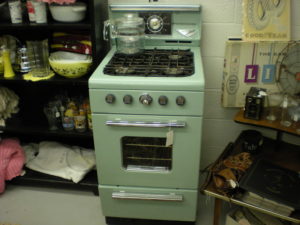Archive for the ‘stove’ Category
Is It Worth Repairing Your Stove?
April 7th, 2024
A malfunctioning stove can be a major inconvenience, disrupting your daily routine and meal preparations. When faced with a faulty stove, many homeowners ponder whether it is better to repair or replace it. The decision depends on several factors, including the age of the stove, the cost of repairs, and the extent of the damage. In this article, we will explore when it makes sense to repair your stove and when replacement might be the better option.
Factors to Consider
1. Age of the Stove
Stoves typically have a lifespan of 10 to 15 years. If your stove is relatively new and still within this range, repairing it might be a cost-effective solution. However, if it is approaching the end of its lifespan, frequent repairs may not be worth the investment.
2. Cost of Repairs vs. Replacement
Before deciding, compare the cost of repairing the stove to the cost of a new unit. A general rule of thumb is if the repair cost exceeds 50% of the price of a new stove, replacement may be the better choice. Minor issues like faulty igniters, burner malfunctions, or thermostat problems can often be repaired affordably.
3. Extent of the Damage
Some issues, such as a broken heating element, a malfunctioning control panel, or a damaged gas line, can be expensive to fix. If multiple components require replacement, it might make more sense to invest in a new stove rather than continuously repairing an old one.
4. Energy Efficiency
Older stoves tend to be less energy-efficient than newer models. If your stove is outdated and causing higher energy bills, upgrading to a modern energy-efficient model could save you money in the long run.
5. Warranty Coverage
Check if your stove is still under warranty. If the manufacturer’s warranty covers the necessary repairs, getting it fixed might be the most economical option. If it has expired, you’ll need to weigh the repair costs against buying a new appliance.
When to Repair
- The stove is less than 10 years old.
- The repair cost is significantly lower than replacement.
- The problem is minor and can be easily fixed.
- The stove is a high-end model with quality components.
When to Replace
- The stove is over 10-15 years old.
- The repair costs are too high compared to a new stove.
- The stove has recurring issues and requires frequent repairs.
- You want to upgrade to a more energy-efficient model.
Deciding whether to repair or replace your stove depends on multiple factors. If the repair is minor and cost-effective, fixing it makes sense. However, if your stove is old and requires frequent, costly repairs, investing in a new appliance might be the smarter choice in the long run. Always consult a professional technician for an accurate diagnosis before making your decision.
Posted in stove | Comments Off on Is It Worth Repairing Your Stove?
Are Small Home Appliances Worth Repairing?
November 28th, 2023
Many people tend to get rid of broken home appliances and buy new ones. However, before throwing it away, opting for a repair would be more economical. Sometimes it can be hard to determine whether the equipment needs a repair or replacement. Therefore, we will offer professional guidance based on certain home appliances. This guide will enable you make the right decision.
Is It Worth Repairing a Microwave?
There are several factors considered before opting for the repair or replacement of a microwave.
When to Repair
During repair, the depreciation of the existing microwave and the cost of replacement is key. If the repair cost is less than the cost incurred to buy it, the repair can be worth it. Moreover, if you paid more money for the microwave, you can repair it if it’s still under warranty. This should be a period of at least 5 years or less.
There are also some minor damages that are worth the repair. When there is an interior light malfunction, you can seek a microwave repair rather than a replacement. Door switch problems are also a minor problem that needs repair. Also, when you have a broken touchpad, a microwave repair can be better.
When to Replace
When your microwave is more than five years old, a microwave replacement is essential. Furthermore, a microwave repair can include hiring trained personnel. In such cases, the cost of repair becomes very high. Therefore, you can opt for a quick replacement.
Other factors that can require a replacement can include loud noises while cooking. When there is a loud buzzing when you hit the start button, this calls for a replacement. Moreover, when the cooking time extends, this can mean that your microwave is old. Therefore, it needs replacement.
Should I Opt for a Dishwasher Repair or Replacement?
A dishwasher is an important equipment in the kitchen. It helps to avoid washing dishes by hand. It is therefore crucial to make the right decision when it comes to a dishashwer repair or replacement. Below are some of the factors you can consider.
Your Dishwasher’s Age
If your dishwasher is more than nine years old, it can be worth replacing it. An old dishwasher will break down more frequently. Therefore, it can be quite costly paying for the repairs.
However, if your dishwasher is less than nine years old, a dishwasher repair can be worth it. At this time, minor issues can be easier to repair at a lower cost. Some of these minor issues can include clogs, broken doors, and door leaks.
Cost
When the cost of a dishwasher repair exceeds the price of a new one, a replacement is economical. This will help minimize the amount of money spent on frequent repairs. A dishwasher repair can be a good choice when its cost is less than that of buying a new one.
Damage of Major Parts
When major parts of a dishwasher break down, this can reduce its efficiency. Therefore, you should opt for a dishwasher replacement. A new dishwasher is more efficient saving on water and energy bills. Some of the features to look at include damage to the energy-efficient motors. Damaged sensors that adjust wash cycles can affect its efficiency. Damaged Eco-modes increase energy consumption reducing the performance of your dishwasher.
Oven Repair or Replacement?
Choosing between an oven repair and a replacement can be challenging. However, understanding the advantages of each of them will help you choose the one you see fit for your oven.
Advantages of an Oven Repair
It can be very cost-effective. In most cases, it is normally cheaper to repair an oven than buying a new one. An oven repair can also help maintain your preferred oven features. Replacing your oven means you will have to adjust to new features and lose your preferred ones.
Advantages of an Oven Replacement
A newer oven is more energy efficient. This helps to minimize utility bills. The more oven repairs done, the less efficient it becomes. Therefore, for an efficient oven, replacement is crucial.
Moreover, a new oven comes with a warranty. This provides you with free oven repairs if anything happens within the specified period.
Finally, both the repair and replacement of your home appliances need qualified personnel. Avoid doing it yourself as this can cause more damage. An expert in the field will ensure that your appliances are working properly. They will also advise on the right time to go for a repair or a replacement.
Posted in dishwasher, disposal, freezer, general, microwave, refrigerator, seasonal, stove, washing machine, wine cooler | Comments Off on Are Small Home Appliances Worth Repairing?
Is It Worth Repairing a Stove?
July 7th, 2022
The calculation of whether to repair or replace a stove is not terribly complex, but it involves a number of considerations. In most cases, repairs are rather simple, especially when they don’t involve the electronics of a stove. In other cases, though, you may want to consider how much life is still left in the appliance, and how much you would like to have a newer one that may have different features or a higher efficiency, especially considering rising costs of gas and electricity.
As a general rule, a well-manufactured stove or range or oven is going to last about 13 to 15 years. Whether the appliance actually reaches that age depends on a lot of things, though, including the size of the family that it is serving (i.e., how frequently it is used), how well it is cared for (keeping the oven reasonably clean will make it operate more efficiently and put less wear and tear on it), and what features it has. For example, a fan oven operates more efficiently than a non-fan oven, because hot air is circulated within the oven. Therefore, lower temperatures can be used to perform the cooking, and this reduces strain on the heating elements, and also conserves energy. Similarly, an induction stove top operates more efficiently than a traditional stove top, in that the cooking pan is itself used as the heating element, thereby losing less energy in the process of heating.
Owners with basic mechanical skills and tools can perform a lot of repairs on their own, depending, of course, on the availability of parts. For example, it’s a pretty straightforward thing to replace the heating element on an electric stove top, provided you are able to find the right heating element. This can often be done by consulting the owners manual, or by performing a web search for the part. It’s always best to bring the part with you to the parts supply store, or to double-check with an online expert at a web store before purchasing the part. In many cases, there will be an aftermarket equivalent available. Fixes to doors and their simple sensors and thermostats that are easily replaceable can also generally be managed by owners with basic mechanical skills and tools, keeping in mind that it is essential that circuit breakers be switched off and appliances unplugged in the case of electrical appliances, and that gas be switched off and care exercised with conduits in the case of natural gas or propane stoves. What is more difficult is electronic parts, although again people with basic electrical skills may be able to replace parts. If you have any doubt at all of your ability to perform a repair, it is worth calling in a professional just for your own safety and peace of mind. If you do want to give a repair a go yourself, YouTube is full of helpful videos that will guide you step-by-step, and in some cases may even show your exact model.
If your stove is still under warranty, of course, you will want to have the repair done by whoever is approved by the manufacturer, particularly if both parts and service are covered. This may involve a bit of a wait, and some adjustment on your part. You can cover the gap by looking for a counter-top stove in FaceBook marketplace or a local charity or second-hand shop to get you by while you wait. Some self-repairs may void your warranty, too, so it’s best to check before you begin. If you’ve been aching to replace your stove for any reason, of course, then it may be worth your while to just go ahead and do it, particularly if you calculate that you can save a lot of time or money in the long run purchasing the one that you want. During lockdown, it was often hard to get ahold of new appliances, but even though supplies aren’t where they ought to be yet, the availability of new major appliances is improving.
Meanwhile, if efficiency really is one of your major concerns, there are some things that you can do to save money on electricity or gas:
– Thaw foods before cooking, unless instructions indicate that they should be cooked from frozen. This requires a little foresight, but reduces the amount of energy needed to cook considerably.
– Using tempered glass or ceramic pans will often reduce the amount of energy needed to cook an item.
– Keep the oven door closed to prevent heat from escaping, when possible, though sometimes the door must be kept open when using an oven as a grill. Also, it is worthwhile making sure that the seal to the door is tight. Damaged seals can be easily replaced, and there are a lot of online videos that will help you with the process. Also, use of a thermometer will cut down on the amount of checking you will have to do by opening the oven door.
– Use the self-cleaning function once in a while to remove material that is cutting down on heat transfer efficiency, and perform a manual cleaning periodically, too.
– On the stove top, flat bottomed pans with tight-fitting lids will cut down on the amount of time and energy needed to cook.
– Consider taking some of the load off of the oven by using more efficient kitchen gadgets, especially for smaller tasks. An InstaPot or similar stand-alone pressure cooker, for example, will use less energy to cook many meals than heating up the whole area of a full-sized oven.
If you decide your repair may be beyond your comfort zone, give Dave’s Appliance a call. Our experienced technicians will give you their best advice, and we sell and service all the best value lines. Our agents are happy to consult with you, and we will steer you to the best solution for you.
Posted in appliance repair, stove | Comments Off on Is It Worth Repairing a Stove?
Is It Worth Repairing My Stove?
October 14th, 2021
Stoves are crucial to your family’s health. If food isn’t cooked properly, it can lead to more than unhappy family members; it can cause illness. If your oven or stovetop isn’t working the way it used to, you need to make a decision whether to repair or replace. When only one burner on the stovetop functions, or the oven is taking forever to preheat, it’s time to consider your options.
The 50% Rule
As with other appliances, the 50% Rule applies: if your appliance is over 50% of its expected lifespan, and it costs more than 50% of its replacement cost to repair it, you’d be well advised to replace it. You can expect most stoves or ovens to give good service for at least 15 years. That time length varies depending on the quality of the stove. Another factor that affects this general rule is the availability of repair parts. Some brands have parts that are harder to replace, or are otherwise not as well supplied by manufacturers. Obviously, that calculation also changes if you are remodelling and want something that’s a better fit either in style or dimension, or if (in the case of an electric oven, particularly) you want something more efficient than what you’ve been using.
Intangible Considerations
Every stove is slightly different, and you may know just how your particular stove works for you. Those who like to bake understand that times and temperatures need to be modified to their appliance, and it is perfectly understandable to want to preserve your stove as long as possible. Likewise, if your stove is an integral part of your kitchen decor, you might be motivated to repair it rather than have something that clashes with the other appliances. These intangible considerations are just as important as the cold monetary calculations.
At-home Repair
Stoves and ovens are a little tricky because of the temperatures they heat to and the electrical or gas elements they use. If you feel confident about tackling an issue yourself, you can check out our DIY guide on gas stoves here, and our DIY guide on electric stoves here. However, if you are at all hesitant about performing your own repairs, skip those and call the helpful, knowledgeable folks at Dave’s Appliance now.
Local and Warranty Repairs
Consumer surveys indicate that on average people are happier with repairs performed by local repair services over factory repairs. Having a local repair company means that they’re really dedicated to you, not the manufacturer. If your warranty is still in force, you should check whether the manufacturer uses local agents.
Additional Costs and Fees
Before deciding to replace your current stove, you should be aware of unintended costs and fees. Beware of stoves with settings or extras you’re unlikely to use. Every addition adds to the cost. And the “smarter” the oven, the more learning for you! Don’t forget that installation costs can be significant for major appliances. At Dave’s Appliance, any quotes we give you include everything, so you’re not going to be unpleasantly surprised: No Hidden Costs, Ever.
If your stove or oven can be safely and cost-effectively repaired, Dave’s Appliance will get it done for you. And if not, they’ll let you know and help you find something new. Give them a call.
Posted in appliance repair, stove | Comments Off on Is It Worth Repairing My Stove?
Is Your Appliance Worth Repairing?
May 13th, 2021
Appliances help us keep our lives on track. Where would we be without our refrigerator/freezer, washing machine, dryer, dishwasher, microwave, and garbage disposal? When any one of these stops functioning, it can quickly turn from an inconvenience into a disaster. Your immediate impulse might be to replace the appliance that is broken. But is that always the right option? Here is a quick guide to help you decide whether your appliance is worth repairing.
How Much Would It Cost?
Generally, the larger the appliance the costlier it is. So if your stove breaks, you’re looking at a major investment to buy a new one. But if your microwave goes, you can purchase one for under $75. Consumer Reports advises that if the cost to repair your appliance is greater than half the cost of a new one, it makes sense to replace it. Obviously you won’t know how much the repair would cost without consulting an appliance repair service. At Dave’s Appliance, our experts can diagnose your appliance’s problem and give you an estimate for the repair. With all of that information, you can make an informed decision.
Which Appliance Is it?
Other than cost, you have to consider how much you value your current appliance. Your refrigerator/freezer may have external ice and water dispensers, pull-out shelving, and other features you really appreciate. Your washer and dryer may fit just perfectly into the space in your utility room. Maybe you love to cook and bake and your stove suits you perfectly. It might even be that your appliances coordinate with your decor. These are definitely legitimate reasons to hesitate about replacing them when they break. Again, a visit from one of the friendly members of Dave’s Appliance team will help you understand the extent of your problem.
How Old Is It and Is It Still Under Warranty?
Major appliances like refrigerators or chest freezers often last from 10 to 20 years. Other appliances like trash compactors have an average life span of about 6 years. Most appliances also come with warranties, and often those can be extended if you choose to do so. When an appliance breaks down, it would be a good idea to find out if its warranty is still in force. If it’s not, check to see what the average life span is for your brand of that particular appliance.
What’s The Environmental Impact?
Often, the environmental impact of repairing or replacing isn’t considered at all. But perhaps you should think about it. If your appliance is old and inefficient, it may be using a lot of electricity. That’s bad for the environment and bad for your utility bills. If your appliance was made after 1992, it should have an Energy Star Rating to let you know how efficient it is. You can compare it to current appliances’ efficiency. On the other hand, your old appliance can’t just be thrown out. Major household appliances are banned from landfills in Wisconsin and the state urges that they be reused or recycled. In many places in Wisconsin, appliances are not picked up at the curb with other recyclables, nor are they accepted at many general recycling drop-off sites. It may be the more environmentally-responsible choice to repair rather than replace.
Whatever your appliance concern, the experts at Dave’s Appliance will be able to tell you what the problem is and help you decide whether or not it’s worth repairing. Give us a call.
Posted in appliance repair, clothes dryer, dishwasher, disposal, freezer, general, microwave, refrigerator, seasonal, stove, washing machine, wine cooler | Comments Off on Is Your Appliance Worth Repairing?
Should I Repair or Replace My Broken Stove or Oven?
April 8th, 2021
Stoves and ovens are a little tricky, because they are a little dangerous to use under the best of circumstances, so when in doubt call in expert help. You can check out our DIY guide on gas stoves here, and our DIY guide on electric stoves here, but if you are at all uncomfortable performing your own repairs, skip those and call the helpful, knowledgeable folks at Dave’s Appliance now.
If your oven or stove isn’t working the way it used to, if it’s taking a long time to heat up, or (in the case of gas) not igniting properly, or heating unevenly, or not performing well in any other way, you have to decide whether to repair or replace.
As a general rule, we are inclined to repair when we can. You can expect most stoves or ovens to give good service for at least 15 years. As with any other kind of appliance, some are better quality than others, made with better parts and generally more durable. Some have parts that are harder to replace, or are otherwise not as well supplied with replacement parts by manufacturers. Some are simply made to be more disposable than others. People who have more money to spend, more room, and who are more serious about their cooking are more likely to shell out for better quality stoves and ovens, and some are serious enough to want commercial quality cooking gear, which will last significantly longer than most home appliances.
The 50% Rule
In general terms, though, as with other appliances, the 50% Rule applies: if your appliance is over 50% of its expected lifespan of 15 years, and it costs more than 50% of its replacement cost to repair it, it may be time to think about replacement. Obviously, that calculation also changes if you are remodelling and want something that’s a better fit either in style or dimension, or if (in the case of an electric oven, particularly) you want something more efficient than what you’ve been using.
Cooking with Gas . . . Maybe Now’s the Time To Buy
It seems likely that under new fossil fuel policies, natural gas prices may rise considerably, though obviously the quantities used in cooking are much less than in home heating. Some people simply prefer to cook with gas, though, and this is a good time to consider whether it might be best to purchase a new gas stove now, before any governmental agencies decide to make it harder or impossible to get them. Chances are such devices will have to be grandfathered in for a couple of decades, anyway.
Warranty Issues
Although consumer surveys indicate that on average people are happier with repairs performed by local repair services over factory repairs, you’ll want to call on your warranty if it’s still in force. If it’s not, the experienced repairmen at Dave’s Appliance can help. A telephone consultation is free.
Installation Fees
Don’t forget that installation costs can be significant for major appliances. Those are included in any quotes that Dave’s Appliance give you, so you’re not going to be unpleasantly surprised: No Hidden Costs, Ever.
What To Keep In Mind When Purchasing a New Oven or Stove
1) Don’t buy anything with bells and whistles that you’re unlikely to use. Those are things that are also likely to break.
2) When purchasing for the elderly, try not to buy anything with advanced electronics they might find hard to use.
3) If you’re going with gas, make sure your home is set up for it. Otherwise, you may shell out significant money getting that set up.
4) Go with a quality brand with a good warranty, and buy an extended warranty if the peace of mind seems worth the cost to you, but do some research to make sure the insurer isn’t fly-by-night.
5) Make sure the dimensions are right for your space. Measure and check, and check and measure again, making sure to leave enough room for hookups.
If your stove or oven can be safely and cost-effectively repaired, Dave’s Appliance will get it done for you. And if not, they’ll let you know and help you find something new. Give them a call.
Posted in stove | Comments Off on Should I Repair or Replace My Broken Stove or Oven?
Oven Maintenance: 5 Ways to Avoid Repair Costs
July 9th, 2020
If you’re like most people, you use your oven every day, often multiple times a day. Keeping your oven in good working order is key. Regular oven maintenance isn’t difficult and can prevent problems from arising. Here are five simple things to maintain your stove and avoid repair costs.
1. Avoid Cleaning
That sounds counter-intuitive, but stay with me here. The best way to clean your stove top is to avoid having to do so. Use deep saucepans so that things won’t boil over. And use a saucepan larger than absolutely necessary. If you need to cover the saucepan, make sure it has a vent, or leave it partially off so steam can escape. Honestly, the choices you make about what pans to cook in make a real difference. In the oven, it’s wise to put a cookie sheet covered in foil on the bottom of the oven so that anything that bubbles over falls on that rather than the oven itself.
2. Clean Spills Right Away
No matter what, there will be some spills and oil from frying can go everywhere. If you wipe them off immediately with warm soapy water and a cloth, they don’t become encrusted obstacles that require intense scrubbing. Spills in the oven can be more problematic. You can’t clean them when the oven is still hot, and it’s easy to forget to do it after the oven cools. If you can remember to clean off any spills before you use the oven again, you’ll find that it’s a lot easier and it will also increase the amount of time between full oven cleanings. And most people forget that the oven racks need to be cleaned too. Doing that frequently makes a big difference.
3. Clean Stove Parts
Occasionally, it’s a good idea to clean the burner drip pans and knobs. If the owner’s manual says that they are dishwasher safe, use that. Otherwise, hot soapy water works just fine. If the drip pans become dingy, just replace them. You can get them in any hardware store and they’re cheap. If you have a ceramic stove top, make it a habit to clean it with the right cleaner. There are special ceramic cleansers out there, but dishwashing liquid and hot water, or a 50/50 solution of vinegar and hot water work great. Don’t use abrasives! They make tiny scratches on the surface and the next spill will cling to them. If your stove doesn’t have a sealed cooktop, lift it up and clean underneath. Food and grease tend to gather there and a 50/50 vinegar water solution can clean it easily.
4. Clean Your Oven
You should clean your oven at least twice a year, and if you use it a lot, you should clean it every couple of months. There’s a lot of debate about whether to use the self-cleaning setting on your oven. Self-cleaning ovens are designed to incinerate food debris by increasing the temperatures in the oven to 900º to 1000º. This takes a long time (from 2 to 4½ hours), and it creates a nasty odor and fumes that can be toxic. If you choose to use it, be sure to keep a window open, and don’t leave the house while the cleaning cycle is on. Alternatively, you could use hot, soapy water and a plastic scrub pad to clean your oven. Clean the window with a damp cloth dipped in baking soda. If it is really dingy, wipe the window with ammonia and let it stand for 30 minutes. Then scrape it off with a plastic tool. If you’re cleaning it frequently, it should never become a dreaded chore.
5. Avoid Electrical Issues
Never wash the burner element itself. That can cause a short and you could find yourself with a nonfunctional range. Also, don’t spray around the knobs; they lead to electrical controls and a squirt could cause a short. Instead, squirt a rag or paper towel and use that to wipe them down. If you have a traditional electric range, don’t wrap the drip pans in
aluminum foil. While that may make them easier to clean, the foil could cause the heating element to short circuit.
As you may have guessed, the key to maintaining your oven is keeping it clean. Make it part of your routine and you’ll avoid unnecessary repairs. The best kept oven can malfunction though, and when that happens, the experts at Dave’s Appliance are here to help.
Posted in stove | Comments Off on Oven Maintenance: 5 Ways to Avoid Repair Costs
No More Gas Stoves? Cities are Proposing Natural Gas Bans
December 3rd, 2019
Gas stoves come with a variety of negatives. Bringing a gas line into a new build increases the cost by $2000 to $5000, and that’s just the beginning. Gas stoves are more dangerous, with a likelihood of gas leaks, and increased possibility of fire. Cooking on gas stoves can cause high levels of indoor air pollution, including nitrogen dioxide, and natural gas lines leak methane directly into the atmosphere.* They are much more inefficient than electric stoves as well.
Gas Stove Bans
For all these reasons, a number of cities are taking steps to decrease the number of gas stoves in homes and buildings. In fact, on July 19, 2019, the City of Berkeley passed a ban on gas stoves for all new single-family homes, townhouses, and small apartment buildings beginning January 1, 2020. And other cities in California, Washington, and Massachusetts are considering bans or limits on use of natural gas in homes and buildings.*
Benefits of Electric Stove
- Incentives. Even without actual gas stove bans, consumers can expect regulatory and financial incentives to choose electric stoves.
- Efficiency. Electric stoves are much more energy efficient than gas ones. Seventy-four percent of the energy produced on an electric range is transferred to food compared to 40% for a gas stove. With an induction range, the efficiency rises to 90%! Induction ranges transfer heat through electromagnetism into conductive cookware (any cookware that contains iron is induction capable).
- Safety. The benefits of electric stoves continue with increased safety and diminished risk of fire. No possibility of gas leaks, and no open flames to catch fire.
- Installation. Electric stoves are simple to install—just plug it in (though some may need a 240 volt outlet).
- Cleaning. They are also easy to keep clean, especially those with a glass or ceramic cooktop. With the traditional electric stove, the ring burners can be removed and the burner pans washed. Simply wipe down the glass or ceramic cooktops with a wet cloth and some dishwashing liquid once it is cool.
- Repair. Electric stove repair is often as simple as replacement of a heating element. Depending on whether it is a range element or a baking element, it may be done without even needing to call an appliance repairman. When your electric stove isn’t functioning properly, an experienced appliance repairman like those at Dave’s Appliance can quickly and easily diagnose the problem and fix it. Electric stove repairs are much less costly and the disruption to your family life is minimal.
With the benefits of electric stoves so apparent, and the trend toward banning or restricting gas stoves, consumers have a clear choice.
*KQED Science 9/24/2019
Posted in stove | Comments Off on No More Gas Stoves? Cities are Proposing Natural Gas Bans
5 Ways to Extend the Life of Your Stove Top
December 3rd, 2019
When you invest in a major appliance, you want to keep it in peak working condition. The best way to do that with a stove is to clean it often. In this post, we will look at how to clean your stove top, whether it is a traditional electric range or a glass or ceramic stove top. We will also explore self-cleaning ovens and how best to use them.
- Prevent stuck-on spills. The best way to clean your stove top is to avoid having to do so. Use deep saucepans so that the probability of boil over is slight. If putting a lid on the saucepan, use one with a vent, or leave it partially off so steam can escape. When the inevitable spill does occur, wipe it up quickly with a warm, soapy cloth.
- Avoid Abrasives. If it is impossible to clean a spill right away, you are confronted with a cooked on spill. Use a sponge with dishwashing liquid and warm water, or a 50/50 solution of vinegar and warm water to clean it. You will be tempted to use a powder abrasive; do not succumb! Abrasives will create tiny scratches in the surface of the stove top and the next spill will cling to these and make it even harder to remove them.
- Clean Stove Parts. Periodically, it is a good idea to clean the burner drip pans and knobs. If the owner’s manual says that they are dishwasher safe, use that. Otherwise, hot soapy water works just fine. If the drip pans become dingy, just replace them. They are readily available in any hardware store and are inexpensive. If your stove doesn’t have a sealed cooktop, lift it up and clean underneath. Food and grease tend to accumulate there and a 50/50 vinegar water solution can clean it easily.
- Beware of Short Circuit Possibilities. Never wash the burner element itself. That can cause a short and you could find yourself with a nonfunctional range. Also, don’t spray around the knobs; they lead to electrical controls and a squirt could cause a short. Instead, squirt a rag or paper towel and use that to wipe them down. If you have a traditional electric range, refrain from wrapping the drip pans in aluminum foil. While that may make them easier to clean, the foil could cause the heating element to short circuit.
- Self-cleaning Ovens. Maintaining the efficiency of your stove as a whole means that you should pay attention to the oven. Keeping the oven clean is the best way to do that. However, if you have a self-cleaning oven, using that feature may not be the best idea. Self-cleaning ovens are designed to incinerate food debris by increasing the temperatures in the oven to 900º to 1000º. Not only does this take a long time (from 2 to 4½ hours), it creates a nasty odor and fumes that can be toxic. It’s best to use hot, soapy water and a plastic scrub pad to clean your oven. Clean the window with a damp cloth dipped in baking soda. If it is really dingy, wipe the window with ammonia and let it stand for 30 minutes. Then scrape it off with a plastic tool.
Your oven is a major appliance that you use every single day. With proper care, it can last decades. These tips on how to clean your stove top and deal with a self-cleaning oven can extend the life of your appliance. With increased energy efficiency, it will be cheaper to run too.
Posted in stove | Comments Off on 5 Ways to Extend the Life of Your Stove Top
A Cook’s Best Friend: Signs Your Kitchen Stove Needs Repair
September 10th, 2019

Constant Gas Smell
A constant gas smell should always cause some concern. Aside from increasing the risk of a fire, a natural gas leak creates excess carbon monoxide. For these reasons, you should not wait to call a qualified Milwaukee stove repair technician. Fortunately, the root of the problem is likely something that can be easily fixed. Often, a burned-out pilot light will cause a gas smell. To be on the safe side, open a few windows until help arrives. (more…)
Posted in stove | Comments Off on A Cook’s Best Friend: Signs Your Kitchen Stove Needs Repair








